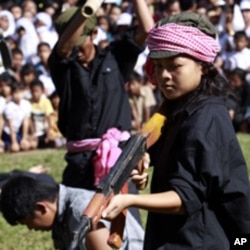A US-based organization for survivors of the Khmer Rouge condemned the UN-backed war crimes tribunal on Thursday for preventing overseas Cambodians from taking part in the court’s controversial third case.
Tribunal observers fear the court is trying to dismiss those cases in the face of stringent government opposition.
The U.S.-based survivors group ASRIC says the war crimes tribunal in Phnom Penh will fail to deliver justice if it ditches its third and fourth cases that are opposed by the Cambodian government.
The judges closed the investigation into case three about one month ago. But the international prosecutor, Andrew Cayley, later said the investigation into case three was deficient and said more work should be done. Since then, Cayley has been ordered by the court to retract the criticism but he says he will appeal the order.
ASRIC says the tribunal cannot decide on the merits of its third case without a proper investigation.
Leakhena Nou is the founder of ASRIC, which is the only Khmer Rouge survivors’ organization in the United States.
“Cambodian survivors and Cambodian society deserve better than this because they’ve suffered for 35 years and they have not had their day in court," she said. "So just prosecuting the five senior-most defendants is not enough if there is evidence that leads to other potential perpetrators, then the court officials need to do the right thing.”
She says that in the past week more than 750 people have signed a petition calling on the UN-backed tribunal to investigate case three properly. She says the court, which has been largely silent on what is going on, needs to do better.
“Well we want more transparency coming from the court. We want more up-to-date information," she said. "And we need the court to settle their differences both on the Cambodian side and the UN. So people just have to put their egos aside and focus on what’s best for the survivors as opposed to their own individual interests.”
The UN-backed tribunal in Phnom Penh was set up to hear cases involving crimes committed by the Khmer Rouge during the movement’s rule of Cambodia between 1975 and 1979.
Around two million people died during that four-year period.
A total of 10 people were expected to be investigated in four cases.
The court concluded the first case last year and convicted the former security chief of the Khmer Rouge of war crimes and crimes against humanity. The four elderly defendants in case two will go on trial next month.
But the Cambodian government has expressed outright opposition to cases three and four. Prime Minister Hun Sen has said that additional prosecutions could destabilize the country’s security.
Critics say that because of the hybrid nature of the tribunal - with Cambodian and international staff in parallel positions throughout its structure - the government opposition has significantly hampered the chances of a proper investigation.
During the investigation into case three, the investigating judges decided not to release any information to the public. The secrecy meant victims of the Khmer Rouge in Cambodia had no way of knowing whether the crimes being investigated affected them.
International prosecutor Cayley has called on the court to extend the May 18 deadline for applications by six weeks. ASRIC, which registered dozens of civil parties for case two, supports that stance.
The investigating judges who have authority over that decision have not commented on the request for an extension.





